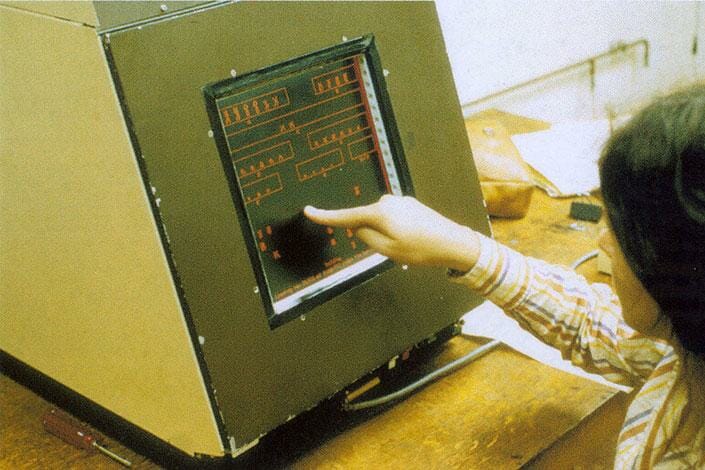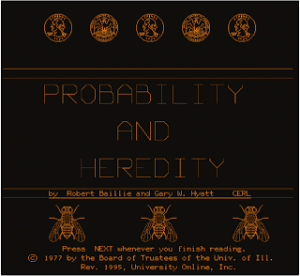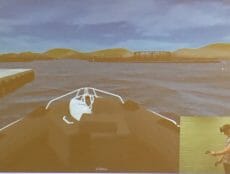
Although eLearning has rapidly expanded since the mid 1990s, its origins stretch back to the early days of computing. PLATO or Programmed Logic for Automatic Teaching Operations originated in 1959. Now, tech entrepreneur Brian Dear has written a book recounting PLATO’s fascinating yet still under-appreciated history and contribution to eLearning. For anyone interested in the history of technology and especially for anyone interested in the evolution of eLearning, Dear’s book, The Friendly Orange Glow: The Untold History of the PLATO System and the Dawn of Cyberculture, is bound to be a must read.
The History of PLATO
The first known experiment in eLearning was based at the University of Illinois at Urbana-Champaign. In 1959, Daniel Alpert and Don Bitzer created Programmed Logic for Automatic Teaching Operations as part of a Computer-based Education Research Laboratory project. Without personal computers nor anything resembling the Internet, eLearning, in its earliest form, still required users to visit a computer lab on campus.
 Following PLATO’s inception in 1959, developers set about turning their idea into an online educational system. By 1969, the computer, once combined to the University of Illinois camps, had reached students at nearby Springfield High School in Springfield, Illinois. In The Computer in the School, a 1975 book by Justin C. Baker, PLATO’s goals are summarized as follows: “By far the most extensive computer-based system in this country, the PLATO goal is to connect 4,096 student terminals by means of telephone lines to the large central Control Data Corporation 6000 series computer system. In March of 1974, there were 450 terminals in the PLATO network.”
Following PLATO’s inception in 1959, developers set about turning their idea into an online educational system. By 1969, the computer, once combined to the University of Illinois camps, had reached students at nearby Springfield High School in Springfield, Illinois. In The Computer in the School, a 1975 book by Justin C. Baker, PLATO’s goals are summarized as follows: “By far the most extensive computer-based system in this country, the PLATO goal is to connect 4,096 student terminals by means of telephone lines to the large central Control Data Corporation 6000 series computer system. In March of 1974, there were 450 terminals in the PLATO network.”
By 1980, Programmed Logic for Automatic Teaching Operations had already exceeded its early developers’ expectations: It offered 7,000 hours of instructional material covering more than 150 subject areas with 7000 thousand terminals offering courses in countries around the globe, including Australia, Belgium, France, Israel, Korea, Sweden, Taiwan, the United Kingdom, Canada, and South Africa.
Dear’s book, however, not only delves into the history of PLATO but the excitement that accompanied its development: “As the system grew and evolved, it became, pretty much by accident, the first major online community, in the current sense of the term. In the early 1970s, people lucky enough to be exposed to the system discovered it offered a radically new way of understanding what computers could be used for: computers weren’t just about number-crunching (and delivering individualized instruction), they were about people connecting with people. For many PLATO people who came across PLATO in the 1970s, this was a mind-blowing concept.” In other words, PLATO wasn’t just integral to the rise of eLearning but perhaps more importantly to the rise of online communities and cyberculture.
Praise for The Friendly Orange Glow
Advance praise for The Friendly Orange Glow published in Publishers Weekly describes Dear’s history as “exuberant,” and offers the following summary: “Dear’s sprawling re-creation conveys the excitement of technological innovation and the freewheeling eccentricity of this vibrant scene—along with the tediousness of IT procedural nitty gritty.”
 A recent of the book in Kirkus is also positive: “The author calls his book the ‘biography of a vision,’ and he’s quite right to do so.” The reviewer adds that this is “A readable tech history, but it helps to have a background in computers to get the most out of Dear’s account. As good an account of PLATO as we’re likely to get—or to need.”
A recent of the book in Kirkus is also positive: “The author calls his book the ‘biography of a vision,’ and he’s quite right to do so.” The reviewer adds that this is “A readable tech history, but it helps to have a background in computers to get the most out of Dear’s account. As good an account of PLATO as we’re likely to get—or to need.”
One of the most fascinating things about Dear’s history of PLATO is the span of time over which it was written (about twenty years) and the depth of research (as detailed on Dear’s website, over one hundred people with connections to PLATO and early eLearning initiatives were interviewed for the book). While PLATO shut down just as many eLearning initiatives were taking off, there is no question that PLATO played a critical role in the development of eLearning over time, and its history is critical to understanding the current landscape of online learning.
The Friendly Orange Glow will be published by Pantheon in November 2017.









No Comments